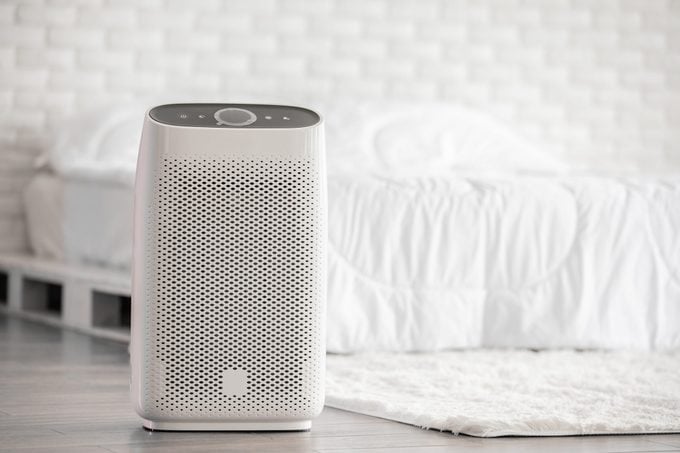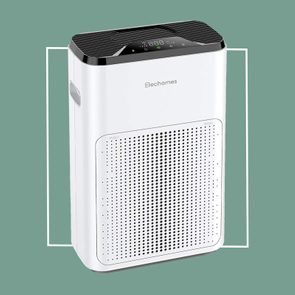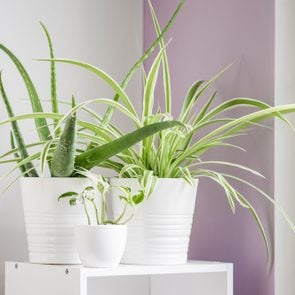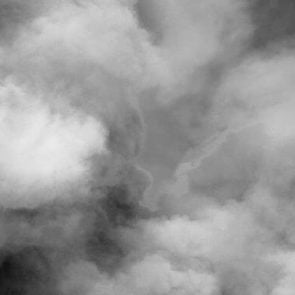4 Times in Your Life You Should Definitely Be Using an Air Purifier
Updated: Oct. 10, 2022
We spend 90 percent of our lives indoors. Here's how to tell if you could be breathing easier with an air purifier.
Our editors and experts handpick every product we feature. We may earn a commission from your purchases.
Why indoor air quality matters
Even though it’s a fundamental human right to breathe clean air, not everyone is fortunate enough to live in an indoor environment that offers that, according to John McKeon, MD, founder, and CEO of Allergy Standards Ltd. (ASL), based in Dublin, Ireland.
“We spend most of our time indoors, particularly in the winter months. According to the U.S. Environmental Protection Agency (EPA), the concentrations of some air pollutants in the indoor environment can be two to five times higher than typical outdoor concentrations,” Dr. McKeon says. His company, ASL, partners with the Asthma and Allergy Foundation of America to certify asthma- and allergy-friendly products.
Indoor air quality can be compromised in several ways, he adds. (These are the 12 household items that are poisoning your air.) If you can’t eliminate the pollution source or increase ventilation enough to allow for more clean air to circulate, an air purifier can be a good solution.
Why air purifiers are trending now
The machines are becoming an increasingly popular topic in light of the coronavirus pandemic. Not only can air purifiers help trap dust, smells, and dander, but they may also reduce the “viral load” or amount of bacteria in the air. The U.S. Centers for Disease Control and Prevention (CDC) continues to investigate how long respiratory droplets can survive in the air.
We know that airborne transmission—especially in enclosed, crowded spaces with little ventilation—can occur with this virus. So to lower the risk for possible asymptomatic or symptomatic spread or to simply deal with usual indoor air pollution, many Americans are investing in home air purifiers. (Here are 15 ways to decrease indoor air pollution in your home.)

How air purifiers work
Air purifiers can be building-wide or installed in your HVAC system, but here we’re focusing on more affordable, easy-to-acquire portable air purifiers. These appliances remove tiny particles often thanks to a high-efficiency particulate air filter (HEPA). HEPA is a type of mechanical air filter designed to trap many sizes of particles, including some that are very fine.
Air purifiers remove pet dander, dust, volatile organic compounds (VOCs), “off” odors, pollen, and air pollution that has floated in from outside. Depending on the model, air purifiers with a HEPA filter may also capture bacterial and viral particles that are 0.3-microns or larger.
Another air purifier option uses short wave ultraviolet-C (UV-C) light to reduce the spread of bacteria and kill viruses. There is limited data about the amount of UV light necessary to inactivate the Covid-19 virus, according to the U.S. Food and Drug Administration (FDA). That said, the FDA also reports that it expects that UV-C light, as opposed to the longer wave ultraviolet rays UV-A or B, will be more effective in dealing with the virus. (Learn more about UV air purifiers and their efficacy.)
For many people, “it’s a good idea to invest in portable air cleaners in rooms where they spend the most time like the bedroom, home office or living room,” says Melanie Carver, chief mission officer for Arlington, Virginia-based Asthma and Allergy Foundation of America (AAFA). If you spend a lot of time driving, you might want to consider a car air purifier too.
More on who can benefit most from this investment shortly, but first, let’s cover how to pick an air purifier that will actually, well, purify. (Here are the best allergist-approved air purifiers.)
How to choose the best air purifier
“When looking for an air cleaner to improve or help control indoor air quality within your home, remember to look for the “asthma & allergy friendly®” certification mark, which means it meets the following standards for air cleaners,” Carver says.
This means the appliance is tested in an environmentally controlled chamber and is proven to reduce allergen levels in the air. (Here’s how doctors allergy-proof their homes.)
“Different types of allergens, like grass pollen, pet dander, and dust mite allergen, are used in testing. Because allergens have different sizes and behave in different ways, it is important to make sure the air cleaner can work with a range of them,” she says. (Learn whether an air purifier vs. humidifier will best keep your symptoms in check.)
It also must not introduce those allergens back into the air—meaning it’s captured on the air purifier filter not redistributed around the room. Look for HEPA filters and an air purifier that is Clean Air Delivery Rate (CADR) certified, the Environmental Protection Agency (EPA) recommends.
Here’s a complete list of portable air cleaners, whole-home air cleaners, and commercial grade air cleaner products that have earned the certification.
As far as where and how to use it, “get a purifier that matches the size of the room you are looking to purify. Usually, the bedroom is most important, so figure out the square footage and choose small, medium, and large accordingly,” says Purvi Parikh, MD, a New York City-based allergist with Allergy & Asthma Network.
Many models offer “auto-off” or “sleep” functions so you can save energy when you’re not in the room. Depending on the conditions, you can run it all the time when you’re around or only as needed (flip on or off, or use on low or high).
You might need an air purifier if you are at high-risk for Covid-19 complications
Respiratory droplet transmission is possible through the air, which is why properly worn face masks are so important and have been effective in reducing the spread of Covid-19.
Air purifiers may be helpful if, say, someone in the house had exposure and is quarantining in a room. The air purifier could help reduce the viral load in the air, lessening risk for caretakers.
They may also be beneficial if someone in your house is high-risk and might face the most severe complications resulting from contracting the disease; the high-risk group includes those with heart, lung, liver, or kidney disease, diabetics, and anyone taking an immune-suppressing drug. An air purifier may help reduce potential exposure from other household members.
Be wary of air purifier products claiming they can outright prevent Covid-19 or destroy the coronavirus. More evidence is necessary to test those claims; also, the EPA does not recommend completely relying on air purifiers for safety due to the lack of current research. However, they can be a great addition to other safety measures like regular sanitizing.
Because one in three Covid-19 cases is asymptomatic, according to just-published research in the journal JAMA Network Open, it can’t hurt to try better ventilation if you or a loved one is high risk.
Three more times you may also need an air purifier
If you live in a fire zone
Outdoor air pollution from things like wildfires generally seeps into indoor air at 50 to 80 percent of their al fresco concentration. That means a lot of the smoke and chemicals are circulating around you all day, even inside if you live near a wildfire, reports the EPA.
For that reason, the CDC suggests an air purifier as part of an overall wildfire impact mitigation strategy to reduce indoor “particulate matter.” In fact, one November 2016 Environmental Health study advises that “portable air cleaners should be at the forefront of the “public health response to landscape fire smoke events” to limit hospitalizations and deaths.
If you own a pet
Any pet owner can verify that it’s not just about the dander. Most pets add odors to the home, as well. To catch smells, hair, dead skin, or anything else your pet may have brought indoors, consider one of the approved air filters. A HEPA filter should be able to catch most of the offenders. (Learn how a messy house can make you sick.)
If you have asthma or allergies
Most people with asthma will benefit from overall less-polluted air, but not all people with allergies will see an improvement in symptoms.
“Air purifiers are often very helpful for people who have allergies to mold or animal dander, as most other allergens are too small in size to filter out,” Parikh says.

















